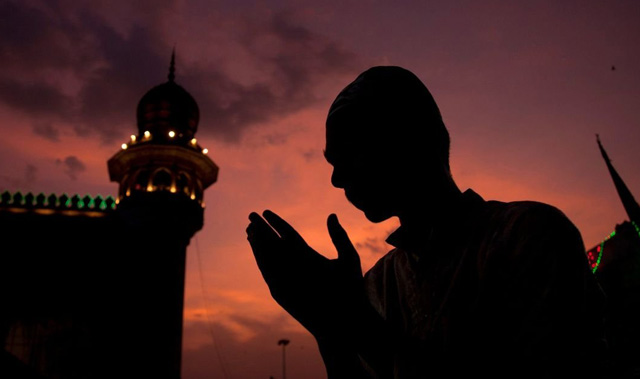Amina Chibani
July 17, 2023
“The Day when there will not benefit [anyone] wealth or children, But only one who comes to God with a sound heart.” (1) The heart is the realm of īmān; it’s a fragile microcosm that needs constant tending and great expertise in handling. Vital at this stage are constant remembrance of God and a teacher that guides our effort of purification.
On the day of reckoning, only a few will be immune to the panic the rest of creation will be in: those whose hearts are sound. The heart is the realm of īmān. There is disagreement as to what comes first: īmān or islām, the inward or the outward. Some scholars such as al-Bukhāri argue that they are one and the same but the hadith is clear on that: islām is the outward practices devoid of spirit, imān is when the heart is involved: good intention, sincerity, devotion, determination, will-power and a host of other qualities are what make īmān, and they dwell only in the heart, without them all the outward gesturing is void and useless. Islam gives the person a social recognition as a Muslim among fellow Muslims, but is no guarantee to be of use in the sight of God if not coupled with īmān . Imān on the other hand, is the King’s pass; it is a delicate matter whose art has been handed down from heart to heart through generations of pious women and men. And it will forever remain just that: a matter of hearts, not books, not sermons and not rulings, only hearts.
The companions of the prophet -peace and blessings be upon him- used to say that they were made to taste īmān in their hearts before receiving Qur’ān so as when they received its āyāt, they cherished and sanctified them as is properly due. They used to lament that some from succeeding generations who learned about Qur’ān without imbibing īmān first, were abusing and discarding its miracles like they would bad dates. How was this “īmān” instilled in the companions’ hearts? What chemistry operated in them and made them so receptive to the hallowed commandments of God and His book.
The first and foremost catalyst was the presence amongst them of our prophet Mohammad, may God bless him and grant him peace, the embodiment and living example of human perfection, which softened their hearts and made it a welcoming receptacle to God’s word. The love they nurtured for him thawed their human egotism and made them into beings in whose eyes the only value of things, people and circumstances lies in how close they take them to their Lord and how high they raise them in His esteem. If ever an unworthy natural leaning or a spiritual illness threatened to take over their hearts, he, the blessed chemist of souls, nursed them adeptly back to health. That was them. What about us, later generations of Muslims. What about our hearts that are wasting away with the love of a man the bodily presence of whom we can only dream of? Are we doomed? God is vastly more clement and just than that. He made the healing light that our messenger personified transferable. Our beloved told us that there will always be a segment of his ummah, learned scholars, heirs of his legacy, who will be the guardians of his light and will pass it down, from heart to heart, until the end of time.
The second ingredient in this formula of īmān is belief in the following six: God, his angels, his books, his messengers, the day of resurrection and divine decree: good and bad. It is basically the belief in ghayb [unseen things], which had it not been for a trusted messenger who taught us about them and imparted to us the knowledge he received of them, we would never have properly learned about them. Our intuition, intellect and innate nature might have given us a dim glimpse into them, but never the like of the certitude and solid knowledge only a faithful emissary can convey. This is why the teaching companion, the depositary of this prophetic knowledge, is crucial in our tradition: “Man is on the dīn of his intimate companion, so let one be careful whom he befriends.” This is why in Qur’ān God says: “in no way would my Lord care for you were it not for those who call to God amongst you.” (2) The last part of this āya [those who call to God : du’āukum] , is commonly translated as “supplication” or “invocation of God” but Ibn Hajar says that exegetes other than Ibn Abbās maintain that the grammatical construction here suggests the meaning of “the call of prophets to their people.” And in another hadīth it is said : “īmānukum du’āukum.” Imam Yassine affirms that in this hadīth, it is meant that our īmān is commensurate with that of those who called us to God, in degree, in nature and in depth. Depending on how long one keeps their company, how much one hears and learns from them and how assiduitly one applies their teachings, one will see the benefit of their companionship and reap the fruits of their guidance.
Then when īmān finds its way into the heart of the believer , comes the task of maintaining its strength and increasing it. For Muslims believe that īmān fluctuates, and there are specific actions and litanies that may help increase it, as there are others that stain the heart and cause īmān to spiral down. Reciting Qur’ān and constantly invoking and remembering God the Almighty are the best way to increase one’s imān, once it is there of course, as no increase is possible for something that is not there to start with. And the only way for īmān to lodge in the heart is to find the right companion, a discerning guide who has been on the journey to the divine and knows the road with its bumps, its thorns, the thieves lying in ambush all along and the safe shortcuts.
To sum up, ascending from the rung of islām to that of īmān requires performing the outward duties of a Muslim with a heart that is full of reverence, awe and love for the creator of man, whose soldiers are angels, who sent down to humanity reminder after reminder, chosen messengers, with books to back their claims, and a perfected character to draw the seekers, entrusting them with the message that life on earth is a test, that bad and good decree are soldiers of God, to see who stands firm and who falters, and that there is an eternity after this life, but in between lurks a heavy day, equal in length to fifty thousand of our earth days, a day when each heart will disclose its content, and only the soundest and purest will earn the beatitude of eternally gazing upon the countenance of He who is beauty, justice and love. Who taught us all that? A perfected messenger whose legacy still lingers in the hearts of countless teachers that are there for whomever wishes to revive, cleanse and heal their hearts, to seek and accompany.




